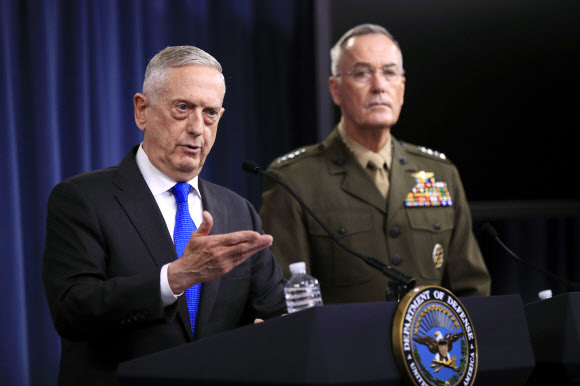Posted on : Aug.30,2018 16:31 KST
Modified on : Aug.30,2018 16:44 KST
 |
|
US Secretary of Defense James Mattis (left) holds a press conference with General Joseph Dunford of the US Marine Corps. (AFP/Yonhap News)
|
Remarks by Secretary of Defense raise tensions in negotiations with North Korea
After the US rattled its negotiations with North Korea with the abrupt cancellation of Secretary of State Mike Pompeo’s a planned trip to North, which would have been his fourth, it has raised the possibility of resuming joint military exercises with South Korea, making the mood even chillier. This was a tough response to press reports that Kim Yong-chol, vice chairman of the Workers' Party of (North) Korea, had suggested that the denuclearization talks could fall through in a letter to Pompeo.
During a press conference about the US defense budget for 2019 that was held at the Pentagon on Aug. 28, US Secretary of Defense James Mattis responded to a question about whether it’s “time to restart military exercises with South Korea, given the recent news that the North Koreans are not denuclearizing” by saying, “We took the step to suspend several of the largest exercises as a good-faith measure coming out of the Singapore summit. We have no plans at this time to suspend any more exercises.”
During a press conference after the Singapore summit on June 12, US President Donald Trump announced that he would suspend the South Korea-US joint military exercises, which he described as being expensive and provocative. This resulted in the suspension of the Ulchi Freedom-Guardian exercises and the Korea Marine Exercise Program (KMEP), which had been scheduled for August. In addition to these exercises, South Korea and the US have held the Key Resolve and Foal Eagle exercises every March.
Mattis said that “we have not made decisions” on when the exercises would be resumed and that “we'll do that in consultation with State. [. . .] We are going to see how the negotiations go, and then we'll calculate the future.”
 |
|
US B-1B bombers in a joint Air Force exercise with South Korean F-15K and KF-16 fighter jets in March. (provided by the Republic of Korea Air Force)
|
Washington’s open pressure on Pyongyang to denuclearize
During a meeting with South Korean Defense Minister Song Young-moo in Seoul in June, Mattis stated that the US would be looking into ways to build confidence and establish peace as long as North Korea remained engaged in good-faith dialogue. These remarks are thought to express a contingency plan that the joint exercises could be resumed if the US decides that North Korea is not participating in the talks in good faith.
North Korea has regarded the South Korea-US joint military exercises as a serious threat. By raising the prospect of resuming the exercises when the warning lights are already blinking because of the cancellation of Pompeo’s trip to the North, the US appears to be playing hardball and putting pressure on the North to denuclearize at the risk of destabilizing the situation.
Mattis’s remarks followed on the heels of reports in the US media that Pompeo’s trip had been cancelled because of a hostile letter that Kim Yong-chol had sent to Pompeo on Aug. 24. With the press highlighting that North Korea was to blame for the trip’s cancellation, the US government appears to be coming down even harder on the North.
During a conference held in Washington on Aug. 28, US Secretary to the UN Nikki Haley reconfirmed the US’s hardline stance on North Korea: “Are they [. . .] changing their mind on denuclearization? [. . .] It’s possible. But we’re not going to change our mind on the sanctions [and denuclearization].”
Pompeo left open the possibility for dialogue with North Korea while calling for “final, fully verified denuclearization.” In a message read by State Department spokesperson Heather Nauert, Pompeo said, “Despite the decision to delay my trip to Pyongyang, America stands ready to engage when it is clear that Chairman Kim stands ready to deliver on the commitments that he made at the Singapore summit to President Trump to completely denuclearize North Korea.”
Mattis says resumption of exercises depends on “how the negotiations go”
Mattis also said that the question of resuming the joint exercises would be decided based on “how the negotiations go”: “Let’s let the diplomats go forward. [. . .] We’ll deal with supporting the diplomats.”
According to one foreign policy analyst, the US still wants to continue talks with North Korea and just wants to check on North Korea’s response.
Now that the US has put the ball in North Korea’s court, the next question is what choices the North will make in the future. The big question is whether it will regard pressure from the US as illegitimate and hit back or treat it as a conciliatory bid for progress in dialogue and seek common ground. Since North Korea is expected to be focused on its Sept. 9 celebration of the 70th anniversary of the establishment of its government, the battle of wills between North Korea and the US is likely to continue for the time being.
By Hwang Joon-bum, Washington correspondent
Please direct comments or questions to [english@hani.co.kr]










